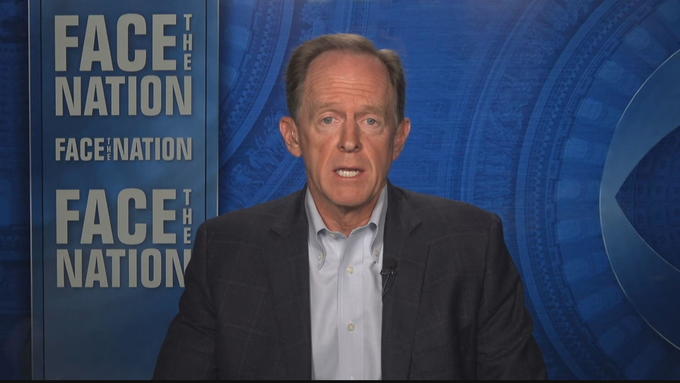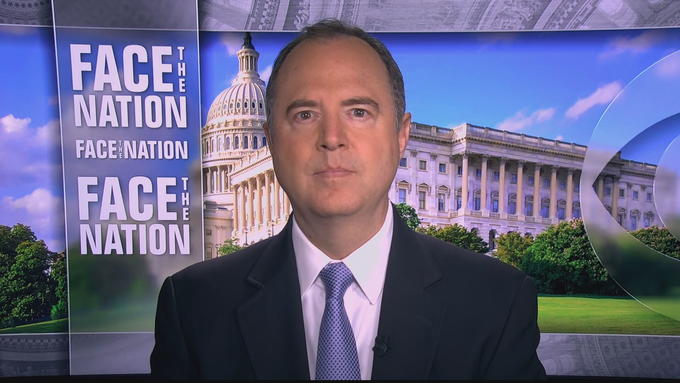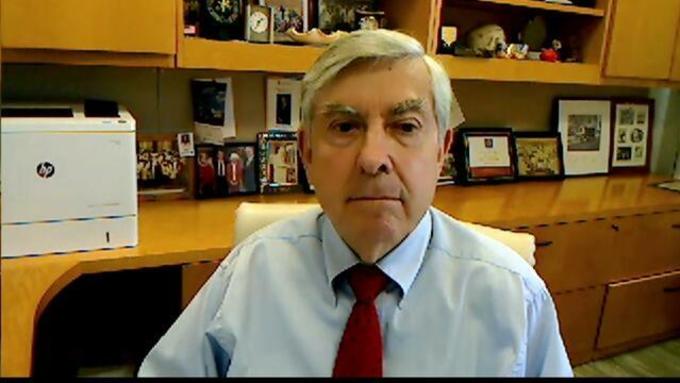| "Something in the space of expanding background checks, I think is very well, it certainly is on the table, and I hope it'll be part of a final package." - Sen. Pat Toomey said Sunday that he has "hope" an expansion of background checks will be part of a final bill to help curb gun violence in America Welcome to the "Face the Nation" Five at Five newsletter. Scroll down for your five takeaways from today's broadcast of "Face the Nation with Margaret Brennan" on CBS. Did someone forward you this? Sign-up at cbsnews.com/email. 1. GOP Sen. Toomey: Expanding gun background checks "on the table"  Sen. Pat Toomey, a Republican from Pennsylvania who is among the bipartisan group of senators negotiating a package of new gun laws, said Sunday that a proposal to expand background checks is "on the table" as discussions continue. What we asked: "So to be clear, because you had proposed the Manchin-Toomey background check expansion in 2013, 2015, 2019. you're saying what's surviving right now is essentially a watered-down version of that. How is it different?" What Toomey said: "This is a moving target, if you will. We're still in discussions, and we are still trying to figure out exactly what mechanism is going to enable us to get the votes that we would need. So I can't be precise about that, Margaret. It hasn't been finally resolved. But something in the space of expanding background checks, I think is very well, it certainly is on the table, and I hope it'll be part of a final package." Why it matters: Toomey is one of six Republican senators working with a group of Democrats, led by Sen. Chris Murphy, to reach a consensus on a legislative proposal to change the nation's gun laws following mass shootings at a grocery store in Buffalo, New York, in mid-May and an elementary school in Uvalde, Texas, 10 days later. 2. Kansas City, Missouri, Mayor: We do not need gun safety solutions that "have already been tried and done"  Quinton Lucas, mayor of Kansas City, Missouri, on Sunday called "prevention" the "most important step" to curbing gun violence in America and criticized measures offered by some Republicans, such as more armed guards and fortifying schools. What we asked: "In your city, Kansas City, according to the FBI's latest data, you rank eighth deadliest in terms of city murder rates. I know you were recently at the White House and told reporters it's important to have locally driven solutions to local problems. So what is the locally driven solution to gun violence in Kansas City?" What Lucas said: "Well, prevention is probably the most important step, not just to local gun violence that we see every day, but also mass shootings. If you just have people showing up after a scene, as we've seen tragically in Uvalde and around America, then we will never get in front of this problem. Some of our locally-driven solutions has been making sure that we're getting guns out of the hands of domestic violence offenders. But we need the support of ATF. We need more investigations, we need an actual permanent ATF director - very reasonable things that I think the president has proposed, and that we continue not to get through the United States Senate. We need permitting and background checks to make sure our police officers can actually stop suspected violent offenders before they're shooting up grocery stores, clubs or anything in Kansas City. That's the support we need. And that's what mayors have been clamoring for. What we do not need are solutions that have already been tried and done. I visit schools every day in Kansas City, almost all of them are fortified. Most of them have armed guards these days, at least one. So these types of solutions, they keep saying have been done. And I think if the Republican Party wants to actually be about solutions, they will say can't we agree on things that at least will stop gun massacres of our young people?" Why it matters: The latest CBS News poll found that 72%of Americans believe mass shootings can be prevented "if we really try." But Republicans, in particular, are less likely to think so, with 44% saying mass shootings are, unfortunately, something that have to be accepted in a free society. 3. Schiff, a Jan. 6 committee member, calls DOJ decision not to charge two former Trump officials a "grave disappointment"  Rep. Adam Schiff, a member of the House select committee investigating the Jan. 6 assault on the U.S. Capitol, harshly criticized a decision by the Justice Department not to prosecute two top aides to former President Donald Trump for defying congressional subpoenas. He called the move a "grave disappointment." What we asked: "The Justice Department, as you know, on Friday decided not to prosecute the former chief of staff, Mark Meadows, or social media director Dan Scavino for refusing to cooperate with your committee. We know the committee said that was puzzling. Is it your understanding that- that these men are immune from all prosecution?" What Schiff said : "No, they're not. And it is very puzzling why these two witnesses would be treated differently than the two that the Justice Department is prosecuting. There is no absolute immunity. These witnesses have very relevant testimony to offer in terms of what went into the violence of January 6, the propagation of the big lie. And the idea that witnesses could simply fail to show up, and when the statute requires the Justice Department to present those cases to the grand jury, they don't, is deeply troubling. We hope to get more insight from the Justice Department, but it's - I think - a grave disappointment, and could impede our work if other witnesses think they can, likewise, refuse to show up with impunity." Why it matters: Schiff said the two aides, who worked closely with Trump and were involved in his efforts to overturn the results of the 2020 election, can testify before the committee with no "plausible claim" of executive privilege, as they both were involved in campaign issues and have records they could turn over to investigators.
4. Former Obama economist: If consumers "slow their roll" on spending, some of the pressure on prices could come down  University of Michigan Professor Betsey Stevenson, who previously served as the Department of Labor's chief economist under former President Obama, provided her take on the U.S. economy and inflation. What we asked: "JP Morgan's Jamie Dimon said a few days ago, 'the hurricane is right out there down the road coming our way. We don't know if it's a minor one or Superstorm Sandy, you've got to brace yourself.' So what should consumers be preparing for?" What Stevenson said: "Well, you know, honestly, what everybody wants consumers to do is slow their roll a little bit on spending. And that would actually bring some of the pressure on prices down. So you know, the Fed's raising rates, hoping that consumers will spend a little bit less. All the, you know, accusations around how much did the stimulus spending contribute, it's really about, do we give people too much money in their pockets, they're in some of the best financial shape they've ever been. And the result is that demand is outstripping supply a little bit. So if people were to pull back voluntarily, then the Fed actually has less work to do. So I think that message of you know, brace yourself, it's great. It's sort of what we need to do. But the reality is that we don't have to stop job growth in order to stop inflation, we might end up accidentally stopping job growth, pushing ourselves into a recession, but it's not a fait accompli, we do not have to do that. What we need to do is get demand down a little bit while supply can continue to grow." Why it matters: Just this week, Treasury Secretary Janet Yellen admitted that she was wrong when she said last year that inflation only posed a small risk and wasn't likely to be a problem. And Americans indicated in a CBS News poll last month that rising costs was one of the most pressing concerns as we get closer and closer to November's midterm elections. 5. Dr. Koroshetz: We have yet to understand what is driving long COVID "biologically"  Dr. Walter Koroshetz, Director of the National Institute of Neurological Disorders and Stroke and co-chair of the NIH's long COVID initiative, talked to us Sunday about where the organization stands on figuring out what causes long COVID symptoms and how to treat them. What we asked: "How is it that we are two years or more into this pandemic and we know so little? And do we at least know that there are treatments for long COVID?" What Koroshetz said: "We don't have, like, a magic bullet or cure for long COVID, because we don't understand what's driving it biologically. And so to get that, you know, holy grail, we need to understand what is wrong in the body that's causing these symptoms, clusters of symptoms, in people. For the other infections that have occurred in the past, we've never been able to figure that out. Those people with post-infectious mononucleosis, people with post-Lyme, they've been suffering the same things. There's a condition called Myalgic Encephalomyelitis/Chronic Fatigue Syndrome, that looks almost identical to what we're seeing. And these have existed for decades, we've never been able to figure them out. And yet people should have hope, because from what we've seen so far, people after COVID, even months after, still are getting better. So it's kind of targeting the symptoms and targeting the underlying biology, the two main avenues we're going after." Why it matters: The COVID-19 pandemic is not over and, as Dr. Koroshetz noted in our full interview, "We don't know what the long-term effects, you know, a decade now, from what has COVID has done to our health in the country." |